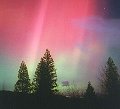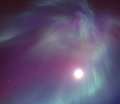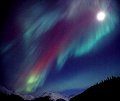|
back to spaceweather.com |
|
Summary: On March 24th (UT) the interplanetary magnetic field (IMF) near Earth turned south -- a condition that lowers our planet's magnetic defenses against solar wind gusts. Northern skies were already glowing because a coronal mass ejection had swept past Earth on March 23rd. As a result of the two events, sky watchers in northern Europe, Canada and parts of the United States saw vivid auroras on both days in spite of a bright Moon and city lights. |
| Photographer, Location | Images | Comments | |
 |
Wade B Clark
Jr,
Hamilton, Washington, USA Mar. 23 |
#1, #2, #3, #4, #5 | Photo details: Fuji NHG II 800 speed color print film, Canon F1 35mm camera, f1.8 28mm wideangle lens. 15 to 30 second exposure times. |
 |
Duane
Clausen,
Menominee, Michigan, USA Mar. 23 |
#1, #2, #3, #4, #5, #6, more | Comet Ikeya-Zhang is visible in photo #6. Can you find it? |
 |
Mike O'Leary, near the entrance
to Denali National Park, Alaska, USA Mar. 23 |
#1, #2, #3 | Photo details: Canon G-2 digital camera; exposure time 5-15 seconds at f/2.8 |
 |
Ken
Cravillion,
Lake Poygan, Wisconsin, USA Mar. 23 |
#1, #2, #3, #4, more | Ken Cravillion captured these photos near Auroraville, Wisconsin. |
 |
Calvin W.
Hall,
near Portage, Alaska, USA Mar. 23 |
#1, #2, #3, #4, #5, more | C. Hall: "The auroras started as soon as it was dark, and the bright moon lit up the Alaska scenery to add a beautiful foreground." |
 |
Robert
Smith,
Stoneville, North Carolina, USA Mar. 24 |
#1 | These faint red auroras appeared on the northern horizon at 5 a.m. in North Carolina. Photo details: Lens: 28mm f 2.8; Film: Fujicolor 400. |
 |
Robert
M. Siciliano,
near Anchorage, Alaska, USA Mar. 23 |
#1, #2, #3, #4, #5, #6 | none |
 |
Joe Slagle, near Flat
Top in Anchorage, Alaska, USA Mar. 24 |
#1, #2 | none |
 |
Daryl Pederson, Girdwood,
Alaska, USA Mar. 23 |
#1 | Auroras over Portage Valley in south central Alaska. |
 |
Juha Kinnunen, 50 km northwest
of Jyväskylä, Finland Mar. 23 |
#1, #2, #3, #4 | J Kinnunen: "The moon added a nice touch to this light show. " Photo details: Nikkor 28mm/f1.4 and Fuji Provia 400F. |
 |
Dominic
Cantin,
Quebec City, Quebec, Canada Mar. 24 |
#1, #2, #3, #4, #5, #6, more | Photo details: 28 mm @ f 2.8, 25 sec, Kodak supra 800 film. |
 |
Larry
Spencer, Bellingham,
Washington, USA Mar. 23 |
#1, #2, #3 | L. Spencer: "Even with all the light pollution from Vancouver BC and the Moon, I still managed to capture the show. I used my Pentax k1000, Kodak 400max film, f2.8 and 15 second exposure time." |
 |
Garth Arsenault, Hampshire, Prince Edward Island, Canada, Mar. 24 | #1, more | G. Arsenault: "The landscape was so bright from moonlight that small trees a half mile away are plainly visible." |
 |
Jesús
Ojeda,
St. Francis, Wisconsin Mar. 24 |
#1, #2, #3, more | Photo details: Sony DSC-F707 digital camera, set to ISO 400, aperture fully opened, 20-30 seconds exposure. |
 |
Philippe
Moussette,
Québec City, Québec, Canada Mar. 24 |
#1, #2, #3, #4, more | Photo details: Coolpix 995 Digital camera. |
 |
Tom Eklund, Valkeakoski,
Finland Mar. 23 |
#1, #2, #3, more | Photo details: 50mm, f/1.4, Fuji Provia 400F, 15 sec. |
 |
Mark Hoffmeyer, downtown Anchorage,
Alaska, USA Mar. 24 |
#1, #2, #3, #4 | M. Hoffmeyer: "The Moon and city lights were bright but the aurora demanded to be seen, and I was willing to oblige. I caught these using an old Minolta X-700 camera and a 50 mm lens. 10 second exposures." |
 |
Brian
Fronczak and Kaleb Lund, on the shore of Lake Superior in Duluth,
Minnesota, USA Mar. 23 |
#1, #2 | Photo details: Nikon Coolpix 995, ISO 100 F6, 35-40 seconds |
|
|